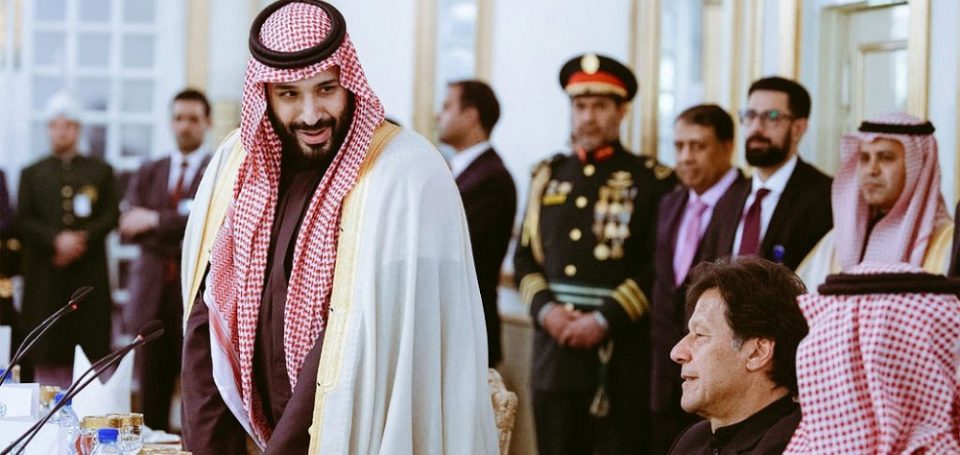Alwaght– Following Saudi foreign minister’s last week trip to Pakistan, diplomatic sources in Islamabad said that Organization of Islamic Cooperation (OIC) would hold a meeting on Kashmir’s situation on Saudi Arabia’s request. Riyadh has adopted an erratic policy regarding Pakistan and Kashmir all to pursue political as well as ideological goals while not harming the economic relations with India that revoked Kashmir’s autonomy in early August.
Saudi Arabia’s instruments to pressure Pakistan
Pakistan with only $8 billion hard currency reserve is among the poorest Islamic countries. In response to the worsening economic conditions, Imran Khan founded the Tahreek-e-Insaf party to work towards the public welfare and get the country out of deepening poverty and the resultant social damages.
That is while the Saudi, and also Emirati, policy traditionally sought to abuse the Pakistani struggling economy to force Islamabad towards the realization of their interests. They stepped up political and economic pressures on Pakistan following a promise to provide $30 billion in aids to Islamabad.
Under the Saudi pressure, Imran Khan skipped an Islamic summit hosted a fortnight ago by Malaysia. Riyadh was not invited to the meeting. Pakistan is one of the founders of the Group of 5 Islamic countries. Commenting to the last-minute pullout, the Turkish President Recept Tayyip Erdogan said that Saudi Arabia and the UAE put strains on Imran Khan to keep him from the meeting. He further disclosed that the Arab kingdom threatened to expel some 4 million Pakistani workers in Saudi Arabia if Imran Khan took part. Riyadh also threatened to withdraw multi-billion deposits from Pakistan’s central bank, according to Erdogan.
The plan to hold the G5 summit was agreed on the sidelines of the United Nations General Assembly gathering in September by Prime Minister Mahathir Mohammad of Malaysia, Erdogan, and Imran Khan. But Saudi Arabia, considering itself to be the leader of the Muslim states, argues that the only discussion reference in the Muslim world is the OIC. The Malaysian PM asserted that the G5 does not intent to rival the OIC.
Yousuf al-Athimin, a Saudi chief of the OIC, in reaction to the G5 meeting said that the OIC is the only place for the Muslims gatherings and dialogue and any collective Islamic action should take place within the framework of the OIC. Furthermore, a Saudi prince in a Twitter post derided the G5 conference saying that any conference not attended by Saudi Arabia is a failed one even before the start.
Recently, Muslim powers have been seeking more effective mechanisms to address the Muslim world issues and concerns as Saudi Arabia keeps its unilateral policies. Some of these countries have proposed inter-Muslimizing the administration of the two holy cities of Mecca and Medina. Riyadh negatively reacts to any Islamic alliance outside its sway. A side effect of this Saudi policy is Islamabad’s unwanted digression from pragmatic foreign policy in favor of national interests.
Conciliating Islamabad
When the Malaysia-hosted conference ended, the Saudi Foreign Minister Faisal bin Farhan Al Saud visited Islamabad amid media silence and met with Imran Khan and the Foreign Minister Shah Mahmood Qureshi. The meeting was to conciliate Islamabad. After all, the absence of Imran Khan in the Kuala Lumpur conference in addition to drawing massive home criticism to the PM damaged the credibility of Pakistan and conflicted with its policy of neutrality Imran Khan adopted since he assumed the power. Dawn New newspaper of Pakistan following the Saudi top diplomat’s visit reported that bin Farhan informed the Pakistani officials of the Saudi plan to call for a meeting of the Muslim Countries to discuss the situation in Kashmir. However, a flashback to the past Saudi policy can test how honest the Saudis are in this suggestion.
When in September, India revoked article 370 of the constitution that gave the disputed Kashmir region a status of autonomy, Saudi Arabia stayed meaningfully silent without even publishing a simple condemnation statement or supporting Islamabad’s stance about the case. Additionally, Saudi Arabia has made huge investments in India. The country is the second-largest oil exporter to India. In 2018, the kingdom sold 4.33 million tons of crude oil to India. In 2017, the Saudi oil giant Aramco announced an agreement with India to build a “mega oil refinery” worth of $44 billion in Ratnagiri port town in western India. The same company also targets the acquisition of 20 percent of India’s Reliance Industries Limited energy company for $15 billion. Moreover, it was in the middle of Indian-Pakistani tensions over Kashmir that Saudi Crown Prince bin Salman traveled to New Delhi and at a meeting with the Indian Prime Minister Narendra Modi promised to invest $100 billion in the Indian economy for the next two years.
Glaringly apparent, Saudi Arabia would not sacrifice this volume of investment and interests in India just for the sake of Pakistan, especially that Riyadh sees its almost $20 billion investment in Pakistan enough to make Islamabad dependent on the Arab kingdom.
On Sunday, Pakistani media reported that Islamabad is preparing itself to host the OIC foreign ministerial meeting in April next year. Coordinating the OIC summit’s agenda with Pakistan’s Kashmir agenda is only deceptive political maneuvering because whether it wanted or not Riyadh would have set such an agenda for the OIC summit to save its face among the Muslim states. But under the new situation, Pakistan will be seen responsible for the OIC agenda and thus Saudi Arabia will be safe from India criticism. Riyadh uses this trick to hit two targets in one shot.
Printed in Al-waght News

